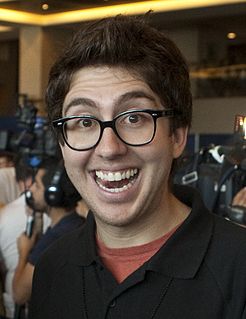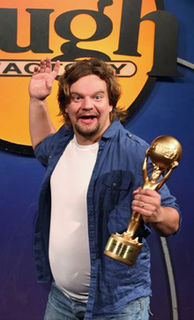
A joke is a display of humour in which words are used within a specific and well-defined narrative structure to make people laugh and is not meant to be taken seriously. It takes the form of a story, usually with dialogue, and ends in a punch line. It is in the punch line that the audience becomes aware that the story contains a second, conflicting meaning. This can be done using a pun or other word play such as irony or sarcasm, a logical incompatibility, nonsense, or other means. Linguist Robert Hetzron offers the definition:
A joke is a short humorous piece of oral literature in which the funniness culminates in the final sentence, called the punchline… In fact, the main condition is that the tension should reach its highest level at the very end. No continuation relieving the tension should be added. As for its being "oral," it is true that jokes may appear printed, but when further transferred, there is no obligation to reproduce the text verbatim, as in the case of poetry.

Humour or humor is the tendency of experiences to provoke laughter and provide amusement. The term derives from the humoral medicine of the ancient Greeks, which taught that the balance of fluids in the human body, known as humours, controlled human health and emotion.

Stand-up comedy is a comedic style in which a comedian performs in front of a live audience, speaking directly to them through a microphone. The performer is commonly known as a comic, stand-up comic, comedian, comedienne, stand-up comedian, or simply a stand-up. Comedians give the illusion that they are dialoguing, but in actuality, they are monologuing a grouping of humorous stories, jokes and one-liners, typically called a shtick, routine, act, or set. Some stand-up comedians use props, music or magic tricks to enhance their acts. Stand-up comedians perform quasi-autobiographical and fictionalized extensions of their offstage selves.

Black comedy, also known as black humour, dark humor, dark comedy, morbid humor, or gallows humor, is a style of comedy that makes light of subject matter that is generally considered taboo, particularly subjects that are normally considered serious or painful to discuss. Writers and comedians often use it as a tool for exploring vulgar issues by provoking discomfort, serious thought, and amusement for their audience. Thus, in fiction, for example, the term black comedy can also refer to a genre in which dark humor is a core component. Popular themes of the genre include death and violence, discrimination, disease, and human sexuality.
An in-joke, also known as an inside joke or a private joke, is a joke whose humour is understandable only to members of an ingroup, that is, people who are in a particular social group, occupation, or other community of shared interest. It is an esoteric joke, i.e., it is humorous only to those who are aware of the circumstances behind it.
A punch line concludes a joke; it is intended to make people laugh. It is the third and final part of the typical joke structure. It follows the introductory framing of the joke and the narrative which sets up for the punch line.
Deadpan, dry humour, or dry-wit humour is the deliberate display of emotional neutrality or no emotion, commonly as a form of comedic delivery to contrast with the ridiculousness or absurdity of the subject matter. The delivery is meant to be blunt, ironic, laconic, or apparently unintentional.

Mitchell Lee Hedberg was an American stand-up comedian known for his surreal humor and deadpan delivery. His comedy typically featured short, sometimes one-line jokes mixed with absurd elements and non sequiturs.
Hal Roach was a prominent Irish comedian. He spent over 60 years in show business as a live performer, having also recorded albums, DVDs and was featured in the Guinness World Records for the longest-running engagement of a comedian at the same venue: 26 years at Jury's Irish Cabaret, Jury's Ballsbridge Hotel, Dublin.
Isaac Asimov's Treasury of Humor is a book of "640 jokes, anecdotes, and limericks, complete with notes on how to tell them".
Observational comedy is a form of humor based on the commonplace aspects of everyday life. It is one of the main types of humor in stand-up comedy. In an observational comedy act, the comedian "makes an observation about something from the backwaters of life, an everyday phenomenon that is rarely noticed or discussed." The humor is based on the premise of "Have you ever noticed?", which has become a comedy cliché. "Observational humor usually takes the form of long monologs of personal narrative; the punchline is either hard to predict or never came."
In comedy, a dick joke, penis joke, balls joke, cock joke or a knob joke is a joke that makes a direct or indirect reference to a human penis, also used as an umbrella term for dirty jokes. The famous quote from Mae West, "Is that a gun in your pocket or are you just excited to see me?" is cited as an example of a penis joke. The "dick joke" has been described as "often used as a metaphor for the male-defined nature of stand-up comedy". Dick jokes have also been noted to be both popular and effective with audiences:
Comics use what "works," and dick jokes are guaranteed to amuse audiences of both genders in a surprising variety of contexts. Simply put, dick jokes get the quickest and biggest laughs, and in stand-up comedy, size does matter.

Humour in Islam refers to the act of doing things that are considered humorous under the guidelines set by the Quran and Muhammad.
Anti-humor is a type of indirect and alternative humor that involves the joke-teller delivering something which is intentionally not funny, or lacking in intrinsic meaning. The practice relies on the expectation on the part of the audience of something humorous, and when this does not happen, the irony itself is of comedic value. Anti-humor is also the basis of various types of pranks and hoaxes.
Certain words have been suggested to be inherently funny. Vaudeville tradition holds that words with the letter k are funny. A 2015 study at the University of Alberta suggested that the humor of certain nonsense words can be explained by whether they seem rude, and by the property of entropy – the improbability of certain letters being used together in a word. The philosopher Arthur Schopenhauer posited that humor is a product of one's expectations being violated. (Realization).

Jacob Penn Cooper Hurwitz is an American comedian, writer, actor, and member of the comedy duo Jake and Amir. He was hired by the comedy website CollegeHumor after becoming an intern there in 2006, and has written and appeared in original videos for the website, as well as contributing articles which have been published both online and in print. He also starred in The CollegeHumor Show, an MTV sitcom that ran for one season in 2009. Outside of CollegeHumor, Hurwitz has hosted Myspace's BFF series.

Amir Shmuel Blumenfeld is an Israeli-American comedian, actor, writer, television host, and member of the American comedy duo, Jake and Amir. Born in Israel, he moved to Los Angeles when he was two, and was hired by the New York City-based CollegeHumor in 2005. As well as contributing to its books and articles, he has written and starred in original videos for the comedy website—appearing in series such as Hardly Working and Very Mary-Kate—and was a cast member on its short-lived MTV program The CollegeHumor Show.

Ismo Leikola, sometimes known just as ISMO, is a Finnish stand-up comedian.
Lawyer jokes, which pre-date Shakespeare's era, are commonly told by those outside the profession as an expression of contempt, scorn and derision. They serve as a form of social commentary or satire reflecting the cultural perception of lawyers.
The first thing we do, let's kill all the lawyers

The Bible and humor is a topic of Biblical criticism concerned with the question of whether parts of the Bible were intended to convey humor in any style. Historically, this topic has not received much attention, but modern scholars generally agree that humor can be found in biblical texts.









